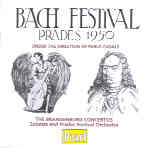The 1950 Prades Festival marked Pablo Casals’ return to performing after a self-imposed silence protesting international acceptance of Spain’s Franco government. If Casals wouldn’t return to the international stage, his friends decided to bring that stage to him in the form of a festival in the Catalan French village a stone’s throw from the Spanish border. Violinist Alexander Schneider was the driving force of the project, described in Pearl’s booklet, and a starry cast of musicians was recruited. On this two-disc set Casals directs the Prades Festival Orchestra in the Bach Brandenburgs, and it goes without saying that this definitely is your grandfather’s Bach, which will not and should not deter historically minded listeners willing to accept stylistic anachronisms and their attendant emotional generosity.
These are not “live” concert recordings; they were made after the concerts in the dining hall of a local girl’s school, and the sound quality is of the rough-and-ready variety. The set begins inauspiciously with a leaden First Brandenburg salvaged by an Adagio notable for its affecting oboes and Schneider’s soulful violin. The Second Brandenburg opens at a frantic pace, and Casals, who throughout imposes strong contrasts between allegros and slow movements, turns the Andante into a schleppy Adagio. Curiosity value comes from substituting Bach’s showy trumpet with the legendary Marcel Mule’s soprano saxophone. By the time we get to the Fourth Concerto the interest level rises sharply, perhaps because our ears have become accustomed to the recorded strings’ shrillness or, more likely, because the quality quotient of the performance has risen.
Disc 2 is the more satisfying, with fascinating renditions of the Fifth and Sixth. The piano cadenza of the former is neatly played by the young Eugene Istomin, and the Affettuoso movement is enthralling, enhanced by Joseph Szigeti’s pinched-toned violin displaying more emotional fervor than would be seemly these days (and all the better for it). After a vigorous Sixth comes the most attractive playing on the set–a substantial helping of the Musical Offering, almost two-thirds of it, consisting of the piano Ricercare played by Leopold Mannes followed by the full Sonata and the six-voice Ricercare, all beautifully done. Schneider again is the dominating force, and in the Largo of the Sonata his violin and John Wummer’s flute phrase sensitively, with finely-placed rubatos that enliven the musical line. Casals fans who want his Brandenburgs should seek out his later Marlboro Festival stereo set on Sony, though this version has historical interest and this Musical Offering is well worth hearing.
































